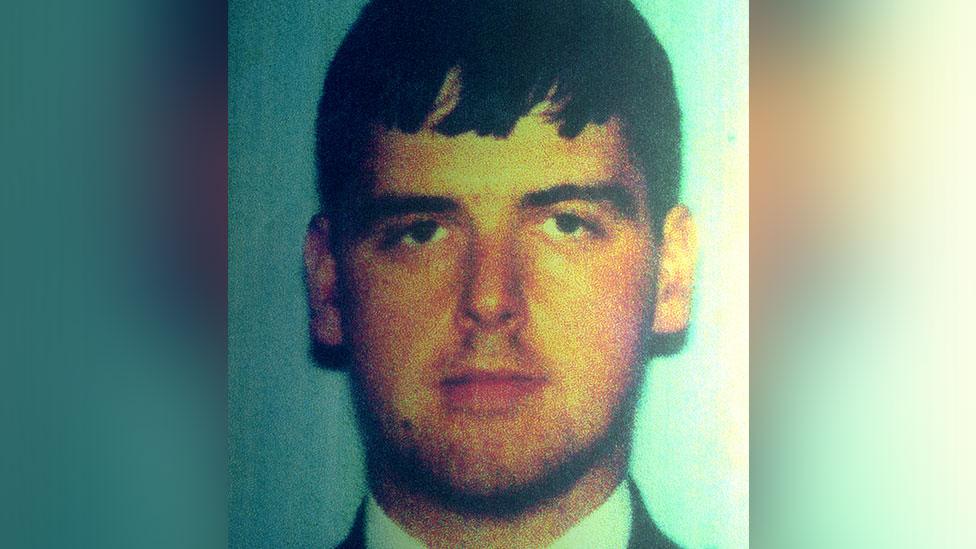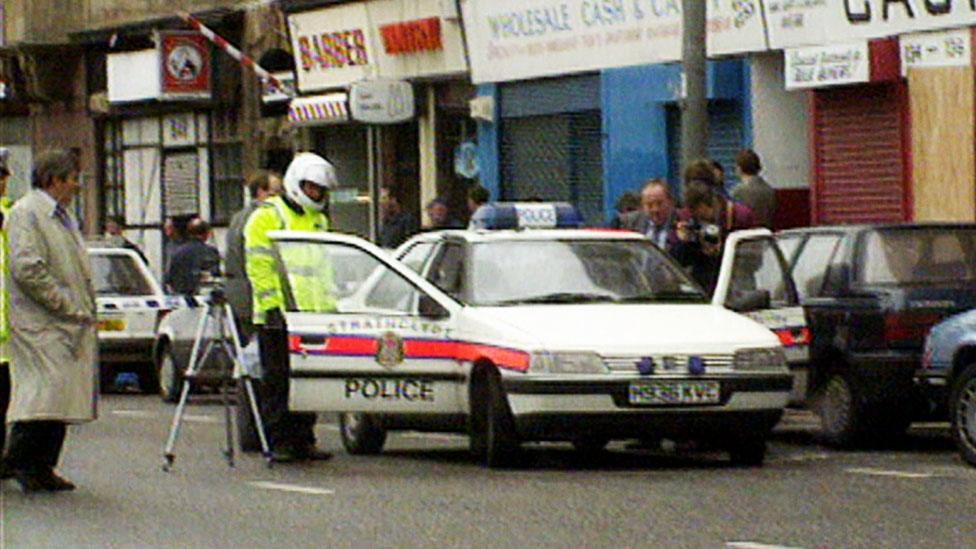Widows in call to jail police killers for life in Scotland
- Published
Christine Fulton: 'The sentence should reflect seriousness of the crime'
The widows of two police officers who died in the line of duty are joining forces to call for a change to the law in Scotland.
Christine Fulton and Lissie Harper want killers of emergency service workers to receive mandatory life sentences.
Ms Harper's husband Andrew was dragged to his death by a getaway car in Berkshire in 2019.
PC Lewis Fulton, Ms Fulton's late husband, was stabbed to death in Glasgow in 1994.
The Scottish government said life sentences are mandatory for all murder convictions in Scotland and they are available as an option for anyone convicted of culpable homicide.
Ms Harper successfully campaigned for a change in the law in England and Wales, after her husband's killers received sentences of between 13 and 16 years for manslaughter.
Harper's Law will mean that anyone who kills an emergency worker while committing an offence will face a life sentence.
Now Ms Fulton, from Ayrshire, wants to the see a similar law change introduced in Scotland.

PC Lewis Fulton was 28 when he died, leaving his wife and seven-month-old son
The pair met through Care of Police Survivors (COPS), a charity co-founded by Ms Fulton in the wake of her husband's death, which helps the bereaved families of police officers.
"Through that we have become good friends," she told BBC Scotland.
"When she started this campaign, all of the wives in COPS were right behind her. She has done an amazing job in such a short time and we are really proud of her."
Ms Fulton added: "In Scotland, we have to follow England and Wales. This is such an important step forward. It's 27 years since my husband died and for 27 years I've been saying that we have to give them [emergency service workers] more support through the courts.
"They have to give out sentences that mark the seriousness of the crime, so now that Harper's Law is going through in England and Wales, it's time for Scotland to step up to the plate."
She said she would like to think a life sentence would also act as a deterrent.
"I'm not altogether convinced that it would, but the threat has to be there - if you disrespect these uniforms, you will go to jail for a long, long time," she added.

PC Fulton was stabbed as he tried to arrest Philip McFadden

He died in Glasgow's Gorbals in 1994
PC Fulton, 28, died in the Gorbals area of Glasgow in June 1994 as he tried to arrest Philip McFadden.
He was survived by his wife and a seven-month-old son, Luke.
Any change in the law would not have affected her husband's killer as he was a schizophrenic and found not guilty of the murder on the grounds that he was mentally ill at the time of the killing.
He was sent to Carstairs Hospital without limit of time, following a hearing at the High Court in Glasgow in 2000. , external
Ms Fulton, who was awarded an MBE for her work with COPS in 2008, said she was proud that her husband's death had resulted in positive action.
"Lewis's death actually brought around a lot of changes in the police service," she said.
"They received stab-proof vests, side-handles batons, better handcuffs, better training in dealing with mentally ill people. It also brought about his two big legacies - Care of Police Survivors and the Scottish Police Memorial.
"Everything that has come from his death has been very positive and this would be another positive step."

PC Andrew Harper married his childhood sweetheart Lissie four weeks before he was killed
PC Andrew Harper, a Thames Valley police officer, died after being dragged for more than a mile behind a car.
He became tangled in a strap attached to the back of the car as he tried to apprehend three teenagers were suspected of stealing a quad bike.
PC Harper had married Lissie, his childhood sweetheart, just four weeks before his death.
Ms Harper told the Sunday Mail, which first reported the story,, external she was surprised Harper's Law had not already been adopted in Scotland.
"It is important that we protect the protectors and it's clear to me this is something the public wants. To me, it is a no-brainer," she said.
Extensive powers
Their plea is also supported by the Scottish Police Federation, which represents rank-and-file officers.
Chairman David Hamilton said: "If legislation was able to come forward and the barriers such as ECHR [the European Convention on Human Rights] could be overcome, then of course it's something we would welcome.
"Taking of a police officer's life is one of the most serious crimes that society can deal with, and if that doesn't merit some kind of mandatory sentence then I don't know what does.
A Scottish government spokesperson said: "Whenever the life of an emergency worker is taken it is a tragedy and we fully support courts having the extensive powers they do in dealing with offenders.
"The family of Andrew Harper has tirelessly campaigned for action and we pay tribute to them and sympathise for their loss.
"In Scotland, a life sentence is mandatory for murder and is available to the court as a sentencing option for anyone convicted of culpable homicide.
"It is for the independent court to sentence in individual cases and the court will take into account the fact a victim is an emergency worker when sentencing."
- Published24 November 2021

- Published19 October 2020
